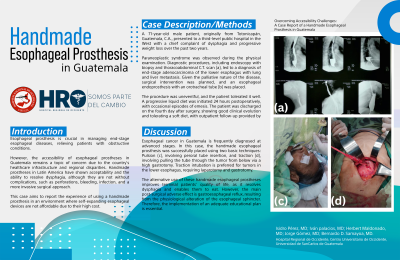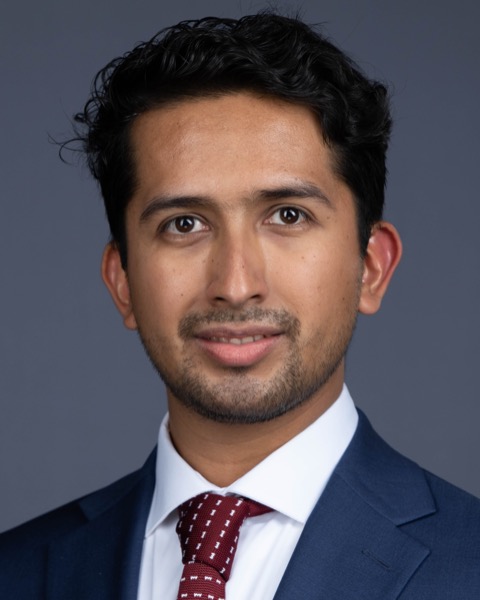Sunday Poster Session
Category: Esophagus
P0499 - Overcoming Accessibility Challenges: A Case Report of a Handmade Esophageal Prosthesis in Guatemala
Sunday, October 22, 2023
3:30 PM - 7:00 PM PT
Location: Exhibit Hall

Has Audio

Bernardo Lopez Samayoa, MD
Johns Hopkins Bloomberg School of Public Health
San Bernardino, CA
Presenting Author(s)
Isidro Pérez Coché, MD1, Iván Enrique Palacios Ramos, MD2, Herbert René Maldonado Tojín, BS3, Jorge Luis Gómez Sacor, BS4, Bernardo Donery Lopez Samayoa, MD5
1Hospital Regional de Occidente, Centro Universitario de Occidente, Universidad de San Carlos de Guatemala, Quetzaltenango, Quetzaltenango, Guatemala; 2Hospital Regional de Occidente, Centro Universitario de Occidente, Universidad de San Carlos de Guatemala, Huehuetenango, Huehuetenango, Guatemala; 3Hospital Regional de Occidente, Centro Universitario de Occidente, Universidad de San Carlos de Guatemala, Totonicapan, Totonicapan, Guatemala; 4Hospital Regional de Occidente, Universidad Mesoamericana, Retalhuleu, Retalhuleu, Guatemala; 5Johns Hopkins Bloomberg School of Public Health, San Bernardino, CA
Introduction: Esophageal prosthesis is crucial in managing end-stage esophageal diseases, relieving patients with obstructive conditions. However, the accessibility of esophageal prostheses in Guatemala remains a topic of concern due to the country's healthcare infrastructure and regional disparities. Handmade prostheses in Latin America have shown acceptability and the ability to resolve dysphagia, although they are not without complications, such as perforations, bleeding, infection, and a more invasive surgical approach. This case aims to report the experience of using a handmade prosthesis in an environment where self-expanding esophageal devices are not affordable due to their high cost.
Case Description/Methods: A 71-year-old male patient, originally from Totonicapán, Guatemala, C.A., presented to a third-level public hospital in the West with a chief complaint of dysphagia and progressive weight loss over the past two years. Paraneoplastic syndrome was observed during the physical examination. Diagnostic procedures, including endoscopy with biopsy and thoracoabdominal C.T. scan (a), led to a diagnosis of end-stage adenocarcinoma of the lower esophagus with lung and liver metastasis. Given the palliative nature of the disease, surgical intervention was planned, and an esophageal endoprosthesis with an orotracheal tube (b) was placed. The procedure was uneventful, and the patient tolerated it well. A progressive liquid diet was initiated 24 hours postoperatively, with occasional episodes of emesis. The patient was discharged on the fourth day after surgery, showing good clinical evolution and tolerating a soft diet, with outpatient follow-up provided by a multidisciplinary team.
Discussion: Esophageal cancer in Guatemala is frequently diagnosed at advanced stages. In this case, the handmade esophageal prosthesis was successfully placed using two basic techniques: Pulsion (c), involving peroral tube insertion, and traction (d), involving pulling the tube through the tumor from below via a high gastrotomy. Traction intubation is preferred for tumors in the lower esophagus, requiring laparotomy and gastrotomy. The alternative use of these handmade esophageal prostheses improves terminal patients' quality of life, as it resolves dysphagia and enables them to eat. However, the main post-surgical adverse effect is gastroesophageal reflux, resulting from the physiological alteration of the esophageal sphincter. Therefore, the implementation of an adequate educational plan is essential.

Disclosures:
Isidro Pérez Coché, MD1, Iván Enrique Palacios Ramos, MD2, Herbert René Maldonado Tojín, BS3, Jorge Luis Gómez Sacor, BS4, Bernardo Donery Lopez Samayoa, MD5. P0499 - Overcoming Accessibility Challenges: A Case Report of a Handmade Esophageal Prosthesis in Guatemala, ACG 2023 Annual Scientific Meeting Abstracts. Vancouver, BC, Canada: American College of Gastroenterology.
1Hospital Regional de Occidente, Centro Universitario de Occidente, Universidad de San Carlos de Guatemala, Quetzaltenango, Quetzaltenango, Guatemala; 2Hospital Regional de Occidente, Centro Universitario de Occidente, Universidad de San Carlos de Guatemala, Huehuetenango, Huehuetenango, Guatemala; 3Hospital Regional de Occidente, Centro Universitario de Occidente, Universidad de San Carlos de Guatemala, Totonicapan, Totonicapan, Guatemala; 4Hospital Regional de Occidente, Universidad Mesoamericana, Retalhuleu, Retalhuleu, Guatemala; 5Johns Hopkins Bloomberg School of Public Health, San Bernardino, CA
Introduction: Esophageal prosthesis is crucial in managing end-stage esophageal diseases, relieving patients with obstructive conditions. However, the accessibility of esophageal prostheses in Guatemala remains a topic of concern due to the country's healthcare infrastructure and regional disparities. Handmade prostheses in Latin America have shown acceptability and the ability to resolve dysphagia, although they are not without complications, such as perforations, bleeding, infection, and a more invasive surgical approach. This case aims to report the experience of using a handmade prosthesis in an environment where self-expanding esophageal devices are not affordable due to their high cost.
Case Description/Methods: A 71-year-old male patient, originally from Totonicapán, Guatemala, C.A., presented to a third-level public hospital in the West with a chief complaint of dysphagia and progressive weight loss over the past two years. Paraneoplastic syndrome was observed during the physical examination. Diagnostic procedures, including endoscopy with biopsy and thoracoabdominal C.T. scan (a), led to a diagnosis of end-stage adenocarcinoma of the lower esophagus with lung and liver metastasis. Given the palliative nature of the disease, surgical intervention was planned, and an esophageal endoprosthesis with an orotracheal tube (b) was placed. The procedure was uneventful, and the patient tolerated it well. A progressive liquid diet was initiated 24 hours postoperatively, with occasional episodes of emesis. The patient was discharged on the fourth day after surgery, showing good clinical evolution and tolerating a soft diet, with outpatient follow-up provided by a multidisciplinary team.
Discussion: Esophageal cancer in Guatemala is frequently diagnosed at advanced stages. In this case, the handmade esophageal prosthesis was successfully placed using two basic techniques: Pulsion (c), involving peroral tube insertion, and traction (d), involving pulling the tube through the tumor from below via a high gastrotomy. Traction intubation is preferred for tumors in the lower esophagus, requiring laparotomy and gastrotomy. The alternative use of these handmade esophageal prostheses improves terminal patients' quality of life, as it resolves dysphagia and enables them to eat. However, the main post-surgical adverse effect is gastroesophageal reflux, resulting from the physiological alteration of the esophageal sphincter. Therefore, the implementation of an adequate educational plan is essential.

Figure: Handmade Esophageal Prosthesis placement: (a) Bird Peak sign, (b) Handmade prothesis made with an endotracheal tube, (c) Pulsion technique, (d) Traction technique
Disclosures:
Isidro Pérez Coché indicated no relevant financial relationships.
Iván Enrique Palacios Ramos indicated no relevant financial relationships.
Herbert René Maldonado Tojín indicated no relevant financial relationships.
Jorge Luis Gómez Sacor indicated no relevant financial relationships.
Bernardo Donery Lopez Samayoa indicated no relevant financial relationships.
Isidro Pérez Coché, MD1, Iván Enrique Palacios Ramos, MD2, Herbert René Maldonado Tojín, BS3, Jorge Luis Gómez Sacor, BS4, Bernardo Donery Lopez Samayoa, MD5. P0499 - Overcoming Accessibility Challenges: A Case Report of a Handmade Esophageal Prosthesis in Guatemala, ACG 2023 Annual Scientific Meeting Abstracts. Vancouver, BC, Canada: American College of Gastroenterology.
